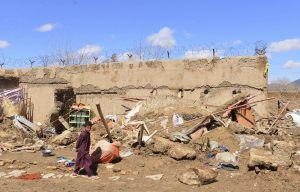By Ezzatullah Mehrdad

One August night under a cloudy sky, Hamid Agha slept peacefully in his home, packed with extended family members, in the town of Charikar in Afghanistan. Around midnight, the rainfall began. The rumble of waters flowing down the hillsides woke Hamid Agha up. He rushed to the door. Clods of earth and rocks hit him and the flood ripped him out of his house.
The flash flood on the night of August 26 highlighted the deadly consequences of climate change in Afghanistan. The heavy dependence on traditional agriculture and rapid population growth make the country extremely vulnerable to climate change, which undermines all aspects of development. The more weather patterns change, the more Afghans suffer – and they have been suffering already through 40 years of war.
The wars have spared few Afghans. They are now doomed to live out a global warming catastrophe, too. Hamid Agha, who had survived the war, was carried away from his home by the flood. He heard children screaming for help amid the apocalyptic scene engulfing his house. Floating away, he caught the wall of his neighbor’s home.
Of those in Hamid Agha’s home that night, he was the only one to survive. The other 10 people were swept away.
“I had earned all of my life,” said Hamid Agha, 50, who goes without a surname. “My hair is white. All I had worked for in my life, my mother, my wife, my children, my daughter-in-law, my grandchildren, my house, and my car were taken away.” Hamid Agha wept in despair and helplessness in the face of climate change.
Hamid Agha sheltered in a neighbor’s house until dawn and began to search for his family in the daylight. The bodies of his loved ones were spread around the neighborhood. He found his mother’s body hanging in a neighbor’s tree. His 18-year-old son had been dragged by the flood into a car, where his body was discovered. Hamid Agha found his grandchild inside their cradle, dead.
From a peaceful August night to a morning of grief – Hamid Agha buried six family members in one day. Two days later, he found the bodies of another son and his daughter stuck in the mud. Four days after that Hamid Agha was still searching for one son and a 2-year-old grandchild. Two sons, in their 20s, who were not home at the time, struggled with Hamid Agha to live on.
“The change in rainfall pattern is a sign of climate change,” said Najib Aga Fahim, former state minister for disaster management. “In recent years, two out of three patches of glaciers in the Pamir and Hindu Kush [mountains] have melted. Winter snowfall is replaced with rainfalls that do not store. There are more flash floods.”
No comments:
Post a Comment